Octet - Study guides, Class notes & Summaries
Looking for the best study guides, study notes and summaries about Octet? On this page you'll find 706 study documents about Octet.
All 706 results
Sort by
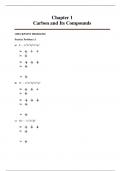 Popular
Popular
-
Solution Manual for Organic Chemistry Mechanistic Patterns Canadian 1st Edition Ogilvie Ackroyd Br
- Exam (elaborations) • 809 pages • 2024
-
- $48.48
- 1x sold
- + learn more
Chapter 1 Carbon and Its Compounds CHECKPOINT PROBLEMS Practice Problem 1.1 a) S — 1s2 2s2 2p6 3s2 3p4 b) Cl — 1s2 2s2 2p6 3s2 3p5 c) Na+ — 1s2 2s2 2p6 1-2 Copyright © 2018 Nelson Education Limited Practice Problem 1.2 a) Count valence electrons. Build a basic bonding framework and account for electrons used. Add remaining electrons and check for formal charges. The molecule has a lone pair on the nitrogen. All other electrons are bonding electrons. b) Count valence...
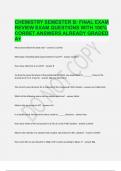 Popular
Popular
-
CHEMISTRY SEMESTER B FINAL EXAM REVIEW EXAM QUESTIONS WITH 100% CORRECT ANSWERSS
- Exam (elaborations) • 3 pages • 2023 Popular
- Available in package deal
-
- $15.99
- 1x sold
- + learn more
What atoms follow the Duet role? Li and Na What type of bonding takes place between N and F? covalent Brainpower Read More Previous Play Next Rewind 10 seconds Move forward 10 seconds Unmute 0:08 / 0:15 Full screen How many electrons is an octet? 8 To draw the Lewis Structure of the polyatomic ion CIO2, you would have to ________ those in the structures of Cl, O, O and O. add one electron to The correct Lewis structure for a molecule of the compound ...
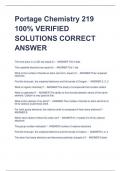
-
Portage Chemistry 219 100% VERIFIED SOLUTIONS CORRECT ANSWER
- Exam (elaborations) • 4 pages • 2023
-
Available in package deal
-
- $7.99
- 4x sold
- + learn more
Portage Chemistry 219 100% VERIFIED SOLUTIONS CORRECT ANSWER The lone pairs in a LDD are equal to: - ANSWER The 2 dots The unpaired electrons are equal to: - ANSWER The 1 dot What is the number of bonds an atom can form, equal to? - ANSWER Their unpaired electrons Find the lone pair, the unpaired electrons and the bonds of Oxygen. - ANSWER 2, 2, 2 What is organic chemistry? - ANSWER The study of compounds that contain carbon What is catenation? - ANSWER The ability to form bonds betw...

-
Chemistry 1010 Final Clemson University test with verified solutions 2024 latest update.
- Exam (elaborations) • 10 pages • 2024
-
Available in package deal
-
- $14.99
- 1x sold
- + learn more
Molecule Unit of matter that results when two or more atoms are joined by covalent bonds Ionic Bond A bond resulting from the electrostatic attraction of a cation for an anion. Brainpower Read More Nonpolar Covalent Bond A bond characterized by an even distribution of charge; electrons in the bonds are shared equally by the two atoms Polar Covalent Bond A bond resulting from unequal sharing of bonding pairs of electrons between atoms Polyatomic Ions Charged g...
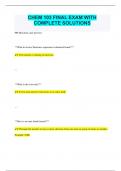
-
CHEM 103 FINAL EXAM WITH COMPLETE SOLUTIONS
- Exam (elaborations) • 52 pages • 2024
-
Available in package deal
-
- $11.99
- + learn more
CHEM 103 FINAL EXAM WITH COMPLETE SOLUTIONS ### Questions and Answers **What do Lewis Structures represent in chemical bonds?** The transfer or sharing of electrons --- **What is the octet rule?** Every atom desires 8 electrons in its outer shell. --- **How is an ionic bond formed?** Through the transfer of one or more electrons from one atom or group of atoms to another. Example: NaBr --- **What do metals do in chemical reactions?** Give electrons --- ...
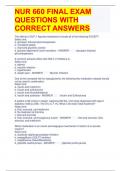
-
NUR 660 FINAL EXAM QUESTIONS WITH CORRECT ANSWERS
- Exam (elaborations) • 41 pages • 2023
-
Available in package deal
-
- $12.89
- 1x sold
- + learn more
NUR 660 FINAL EXAM QUESTIONS WITH CORRECT ANSWERS The effects of GLP-1 Agonist medications include all of the following EXCEPT: Select one: a. glucagon induced gluconeogenesis b. increased satiety c. improved glycemic control d. glucose dependent insulin secretion - ANSWER glucagon induced gluconeogenesis A common adverse effect with SGLT-2 Inhibitors is: Select one: a. edema b. mycotic infection c. hypertension d. weight gain - ANSWER Mycotic Infection Due ...
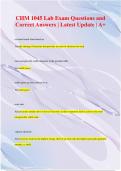
-
CHM 1045 Lab Exam Questions and Correct Answers | Latest Update | A+
- Exam (elaborations) • 31 pages • 2024
- Available in package deal
-
- $13.99
- + learn more
covalent bonds form based on Ans:the sharing of electrons that provides an octet of electrons for each most energetically stable elements in the periodic table Ans:noble gases noble gases are also referred to as Ans:inert gases octet rule Ans:all atoms should strive to have 8 electrons in their outermost shell to achieve the most energetically stable state valence electrons Ans:electrons found in the highest energy shell of an atom (aka the highest principle quantum number, n, shell...
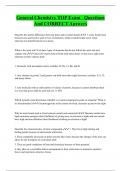
-
General Chemistry TOP Exam Questions And CORRECT Answers
- Exam (elaborations) • 65 pages • 2024
- Available in package deal
-
- $9.99
- + learn more
Describe the atomic differences between Ionic and Covalent bonds. 1. Ionic bonds form between ions and involve gain or loss of electrons, while covalent bonds occur when electrons are shared between two atoms What is the octet rule? List three types of elements that do not follow the octet rule and explain why. Octet rule=atoms tend to bond with other atoms so they have eight outer electrons in their valence shell 1. Elements with incomplete octets, includes: H, He, Li, Be, and B. 2. ...
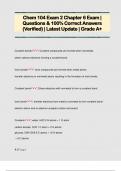
-
Chem 104 Exam 2 Chapter 6 Exam | Questions & 100% Correct Answers (Verified) | Latest Update | Grade A+
- Exam (elaborations) • 20 pages • 2024
-
- $11.49
- + learn more
Covalent bonds: Covalent compounds are formed when nonmetals share valence electrons forming a covalent bond. Ionic bonds: Ionic compounds are formed when metal atoms transfer electrons to nonmetal atoms resulting in the formation of ionic bonds. Covalent bond: Share electrons with nonmetal to form a covalent bond Ionic bond: transfer electrons from metal to nonmetal to form covalent bond - electron donor and an electron acceptor (cation and anion) Covalent: water, H2O 2 H atoms + 1 O ato...
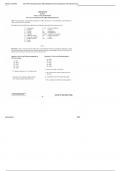
-
AP Chemistry Exam MCQ Multiple Choice Questions with Answers Advanced, Graded A+
- Exam (elaborations) • 78 pages • 2024
- Available in package deal
-
- $14.69
- + learn more
Question 1 refer to the following compounds at 25∞C and 1.0 atm. (A) CO2 (B) PbO2 (C) CaO (D) N2O5 (E) Cu2O 1. Contains an element in a +1 oxidation state Questions 4-7 refer to the following species. (A) H2O (B) NH3 (C) BH3 (D) CH4 (E) SiH4 4. Has two lone pairs of electrons 5. Has a central atom with less than an octet of electrons 6. Is predicted to have the largest bond angle 7. Has a trigonal-pyramidal molecular geometry Questions #2 & 3 did not align with the
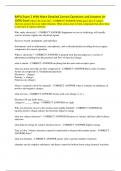
-
BAPA Exam 2 With More Detailed Correct Questions and Answers A+ 100% Excel what is the octet rule? - CORRECT ANSWER-Noble gases have 8 valence electrons and are the most stable elements. Other atoms react to form compounds that allow them to also have 8 v
- Exam (elaborations) • 21 pages • 2024
-
Available in package deal
-
- $14.49
- + learn more
BAPA Exam 2 With More Detailed Correct Questions and Answers A+ 100% Excel what is the octet rule? - CORRECT ANSWER-Noble gases have 8 valence electrons and are the most stable elements. Other atoms react to form compounds that allow them to also have 8 valence electrons Why study electricity? - CORRECT ANSWER-Equipment we use in Audiology will usually convert acoustic signals into electrical signals Easier to record, manipulate, and reproduce Instruments such as audiometers, microphone...

Study stress? For sellers on Stuvia, these are actually golden times. KA-CHING! Earn from your study resources too and start uploading now. Discover all about earning on Stuvia


